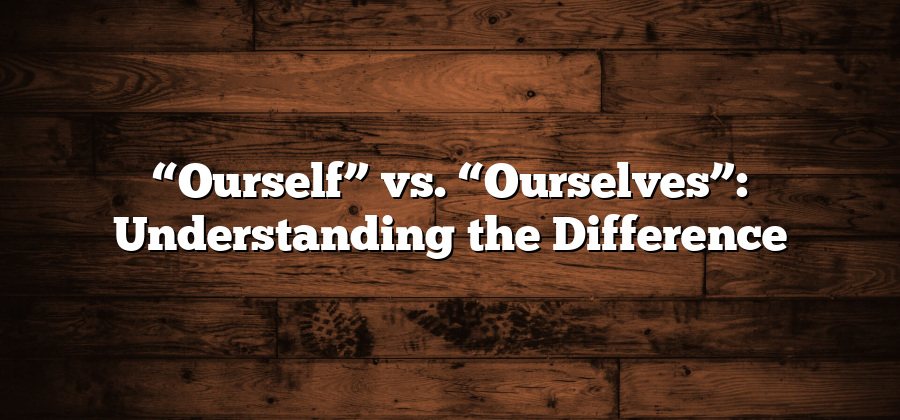In English, the words “ourself” and “ourselves” are both reflexive pronouns, but they are used in different contexts. Understanding when to use each can help you communicate more effectively. Here’s a breakdown of the difference and when to use each one.
“Ourself” – A Singular, Archaic Form
The word “ourself” is the reflexive form of the pronoun “we” used in the singular. This usage is largely considered archaic or old-fashioned and is now rarely seen in modern English. You might encounter it in historical texts, older literature, or even in certain religious or poetic contexts.
For example, in some religious or formal writing, you may come across sentences like:
- “If ourself were in need, we would call for help.”
- “We must treat ourself with kindness.”
However, this usage is so infrequent in contemporary English that it is typically regarded as incorrect or overly formal in everyday speech or writing.
“Ourselves” – The Common Reflexive Pronoun
In modern English, the correct reflexive pronoun for “we” in both singular and plural contexts is “ourselves.” This form is used to refer back to the subject of the sentence (we) and can be used in both formal and informal speech. It is the standard reflexive form used in contemporary English.
Examples of proper usage include:
- “We looked at ourselves in the mirror.” (plural, most common usage)
- “We blamed ourselves for the mistake.” (plural)
- “We asked ourselves why this had happened.” (plural)
- “We should take care of ourselves.” (plural)
The key takeaway is that “ourselves” is the reflexive form used when you are talking about a group that includes you.
Important Points to Remember:
- Use “ourselves” for all instances of reflexive pronouns referring to “we.” Even if you’re talking about a singular collective group (e.g., “our team” or “our family”), you should still use “ourselves” rather than “ourself.”
- “Ourself” is not commonly used in modern English and is often found in older writings or specific religious and poetic contexts.
- Avoid “ourself” in casual speech or writing. It may sound stilted or incorrect, unless you’re aiming for a historical or stylistic tone.
Conclusion
While both “ourself” and “ourselves” are reflexive pronouns, “ourselves” is the form that should be used in most contexts today. “Ourself” is an outdated form that rarely appears outside of specific or archaic contexts. For clarity and correctness in contemporary English, always opt for “ourselves” when referring back to the subject “we.”
By understanding these nuances, you’ll ensure that your language is both grammatically correct and in line with modern usage.
sweety or sweetie
sweetie or sweety
myself or my self
cacoon or cocoon
sweatie
sustain vs substain
unloyal or disloyal
mid next week
awaiting vs pending
gauging interest
good bye or goodbye
night time or nighttime
fairer or more fair
pending vs awaiting
ect or etc
persue
time has flown by
assistants vs assistance
goodbye or good bye
me as well meaning
mid-next week
pursue or persue
here is or here are
brief vs debrief
time has flown
all are welcomed
sweetie of sweety
good-bye or goodbye
sweety sweetie
substain vs sustain
my sweety or sweetie
sweety or sweetie which is correct
well received
awaiting or pending
invision or envision
my self or myself
disloyal or unloyal
nighttime or night time
ourselves or ourself
me as well
swop vs swap
gaging interest
ourself vs ourselves
sweetie o sweety
pursue vs persue
gasses or gases
myself vs my self
swap or swop
mid of next week
mid next week meaning
sweety ou sweetie
myself atau my self
nighttime vs night time
by mid next week
i as well
insights on
sweetie oder sweety
insights on or about
sweetie vs sweety
myself my self
goodbye ou good-bye
time has flew by
newfound or new-found
goodbye vs good bye
next mid week
my self and myself
unloyal vs disloyal
difference between persue and pursue
my self or myself meaning
insight on or into
next midweek
insights on or into
mid week next week
insights into
“mid next week”
night-time or nighttime
dependence vs dependency
here is or are
by mid next week meaning
insight preposition
sweetie or sweety spelling
an ma or a ma
i can’t believe how time has flown by
sweatie meaning
what is mid next week
pending vs waiting
family’s or families
insights about or on
goodby or goodbye
good bye ou goodbye
sweaty or sweetie
have come or have came
what does envision mean
an or a unique
are also welcomed
etc or ect
substain
gases or gasses
ourself or ourselves
addenda vs addendum
is it etc or ect
invision vs envision
hastle
persue vs pursue
swap vs swop
gauge interest meaning
nighttime or night-time
informational vs informative
envision vs invision
persue or pursue
gauging interest meaning
gases vs gasses
segway in conversation
envision or invision
glueing or gluing
smooth or smoothe
to or too
interested in or on
ourselves vs ourself
inpatient or impatient
to vs too
lifetime or life time
accumulative vs cumulative
segway or segue
informative vs informational
assistance or assistant
to and too
assistance vs assistant
segway conversation
anyone has or have
does anyone has or have
cumulative vs accumulative
does anyone have or has
gauge interest
hastle or hassle
here are or here is
smoothe vs smooth
addendum vs addenda
swop or swap
segway meaning
segway definition
etc vs ect
goodbye or good-bye
informational or informative
sweety or sweetie meaning
gage interest meaning
persuing
too vs to
segue vs segway
ect vs etc
ourself atau ourselves
how to spell persue
swap or swop uk
myselves or myself
my condolences meaning
persuing or pursuing
segue or segway
ect. or etc
is it ect or etc
smoothe
assistance and assistant difference
gasses vs gases
flown by or bye
family’s or families
hasnt vs havent
mid next week or mid-next week
ect etc
etc ect
my self atau myself
interested preposition
what is a segway in a conversation
etc. or ect
smooth vs smoothe
guaging interest
is it unloyal or disloyal
night time vs nighttime
is it disloyal or unloyal
debrief vs brief
time has flown by meaning
ect… or etc
difference between assistant and assistance
me as well or i as well
sweety or sweaty
sweety vs sweetie
difference between assistance and assistant
addenda or addendum
unloyal or disloyal is correct
ourself
gage interest
impatient or inpatient
take effect or take affect
repeat again
cocoon or cacoon
time has flown by or bye
far fetched meaning
here are
what is an information text
difference between to and too
addendum plural
all are welcome or welcomed
middle of next week
gluing or glueing
to gauge interest
etc ou ect
looking forward to seeing you
conversation segway
ok thank you
has anyone or have anyone
gaging or gauging
sweety of sweetie
here is or here are the details
plural of gas
thank you sweetie or sweety
sweety oder sweetie
insights into or on
difference between ourself and ourselves
difference between become and became
feel and felt difference
is new found hyphenated
ect abbreviation
mid next week means
currently waiting for approval!
annunciate vs enunciate
segway into a conversation
there is no
has flown by
became or become more understanding
assistant and assistance difference
segue segway
all is welcome or all are welcome
addendum or addenda
feeled or felt
smooth and smoothe
become became become
too or to
difference between too and to
the time has flown by
addenda vs addendums
segway in a conversation
comma after e.g. or not
to gage interest
define gauge interest
anyone have or has
swop meaning
when to use to whom it may concern
assistant vs assistance
thank you, sweetie or sweety
is it sweetie or sweety
time flown by
الفرق بين sweet و sweetie
how time has flown by
when is midweek
too to
sweetie ou sweety
segway vs segue
addendum addenda
sweety definition
enunciate or annunciate
how to spell etc
informative or informational
assistant or assistance
ect. abbreviation
everyone is welcome or welcomed
hassle or hastle
difference between addenda and addendum
is it gases or gasses
serpent vs snake
all are welcome or all are welcomed
feeling nostalgic
ourself and ourselves examples
lifetime vs life time
newfound or new found
there are no
inpatient vs impatient
ourself oder ourselves
swop vs swap uk
ect of etc
new found meaning
pending approval meaning
ect. or etc meaning
became or become
does anyone have
gasses
ect ect meaning
difference between addendum and addenda
how do you spell persue
become or became
comma after e.g.
etc. or etc
is it sweety or sweetie
myself o my self
disloyal vs unloyal
flown bye or by
i as well or me as well
preposition of interested
enunciate vs annunciate
addendums or addenda
sweety meaning
me as well or me too
feel vs felt
an unique or a unique
afterward or afterwards
persued
become and became different
what’s the difference between a snake and a serpent
she haven’t or hasn’t
segway topic
impatient vs inpatient
insights preposition
my self myself
different between assistant and assistance
goodbye or good-bye uk
comma after eg
sweety vs sweaty
flown by or flew by
myselfe or myself
newfound vs new found
ourself ourselves
smoothe or smooth
plural of addendum
indigo vs violet
myself vs myselves
insights on or insights into
myself or myselves
sweety czy sweetie
segway a conversation
interest in or on
ect o etc
ect ou etc
segway dictionary definition
midweek next week
time has flew by or flown by
time has really flown by
ourself или ourselves
become and became difference
if anyone has or have
gauging or gaging
there is no or there are no
comma after e.g
far fetched definition
to or too examples
too and to
disloyal or unloyal which one is correct
all are welcomed or all are welcome
middle of next week meaning
time has flied
well said meaning
briefing vs debriefing
anybody has or have
flown by
is there a comma after e.g.
e.g. punctuation
sweety or sweetie spelling
gauging your interest
addendums of addenda
is it nighttime or night time
etc oder ect
segway into conversation
we look forward to seeing you
comma after i.e.
more fair or fairer
difference between brief and debrief
myself and my self
requester or requestor
interested on or in
and etc or etc
the difference between to and too
what does mid next week mean
difference between pursue and persue
addenda versus addendum
pursue persue
by mid of next week
is nighttime a compound word
spell persue
far-fetched meaning
here is
e g punctuation
define gauging interest
is it goodbye or good bye
lifetime or life-time
difference between gases and gasses
insights to or insights on
gauge your interest
interested on
“mid-next week”
invision spelling
is it envision or invision
pending approval betekenis
all are welcome to join
what is gaging
good bye vs goodbye
an unique
cumulative or accumulative
comma after e g
feeling nostalgic meaning
unloyal meaning
i.e. comma
middle next week
difference between envision and invision
swop vs swap meaning
is ect or etc
anyone has or anyone have
she hasn’t or haven’t
pursuing or persuing
anyone has
take effect or affect
e.g. comma
sweety
does e.g. need a comma
feel felt felt
flew by or flown by
how to spell invision
what is the difference between assistant and assistance
swap swop difference
newly found meaning
my self vs myself
midweek or mid-week
accumulate vs cumulate
comma after ie
felt feel
look forward to seeing you
etc or etc
to versus too
sweety o sweetie
goodbye or good bye grammar
how to spell gauging interest
ect. of etc
insights into or insights on
difference between briefing and debriefing
life time or lifetime
a unique or an unique
feel or felt
etcetera etc or ect
addenda plural
topic segway
had vs have
gas plural
we are looking forward to seeing you
family plural
ie punctuation
segway dictionary meaning
mid of next week meaning
me too or me as well
time has just flown by
new found vs newfound
families or familys
how time has flown
debrief vs briefing
gauge interest definition
nighttime or nightime
sweety spelling
adapter or adaptor
ect oder etc
etc o ect
our self or our selves
how to use ect.
become became
what does etc stand for
what can the phrase “laundry later” be an example of?
mid next week in a sentence
persye
early to mid next week
gauged interest
swap vs swop meaning
the year has flown by
accumulatively vs cumulatively
persue spelling
to take effect
anyone who have or has
define segway into
it has flown by
sweety atau sweetie
unloyal disloyal
pursue and persue
assistance and assistant
preposition for interested
ourself or ourselves which is correct
addenda and addendum
mid-week or midweek
hasn’t or haven’t
ourselves or ourselfs
had have
i.e. comma after
plural for addendum
segway word definition
is it inpatient or impatient
waiting approval or awaiting approval
pursue vs persue meaning
is me as well grammatically correct
time has flown by so fast
sweetie sweety
gluing or glueing uk
anyone have
addendum and addenda
segway segue
felt or feel
plural of family
time has flown by or flew by
myself ou my self
undefined










